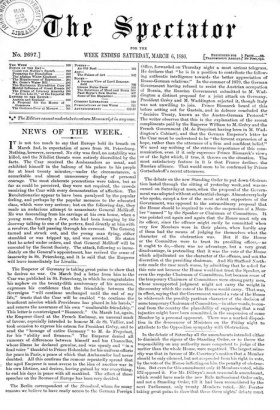The Berlin correspondent of the Standard, whom for many reasons
we believe to have ready access to the German Foreign
Office, forwarded on Thursday night a most serious telegram.. He declares that "he is in a position to contribute the follow- ing authentic intelligence towards the better appreciation of Russo-German relations." In the summer of 1879, the German Government having refused to resist the Austrian occupation of Bosnia, the Russian Government submitted to M. Wad- dington a distinct proposal for a joint attack on Germany. President Grevy and M. Waddington rejected it, though Italy was not unwilling to join. Prince Bismarck heard of this before setting out for Gastein, and in defence concluded the "decisive Treaty, known as the Austro-German Protocol." The writer observes that this is the explanation of the recent compliments paid by the Emperor William to M. Grdvy and the French Government (M. de Freycinet having been in M. Wad- dington's Cabinet), and that the German Emperor's letter to the Czar must be understood to be "the fervent expression of a. hope, rather than the utterance of a firm and confident belief." We need say nothing of the extreme importance of this com- munication, even if it only expresses Prince Bismarck's view; or of the light which, if true, it throws on the situation. The most satisfactory feature in it is that France declines the Russian alliance. That would seem to he confirmed by Prince Gortschakoff's recent utterances.


































